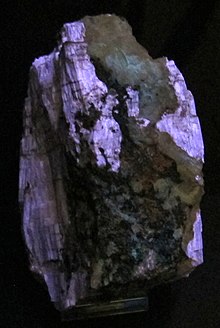| Agrellite | |
|---|---|
 Agrellite showing fluorescence in ultraviolet light | |
| General | |
| Category | Inosilicates |
|
Formula (repeating unit) | NaCa2Si4O10F |
| IMA symbol | Are [1] |
| Strunz classification | 9.DH.75 |
| Crystal system | Triclinic |
| Crystal class | Pinacoidal (1) (same H-M symbol) |
| Space group | P1 |
| Identification | |
| Color | White, grayish-white, greenish-white |
| Crystal habit | Lath - shaped like a small, thin plaster lath, rectangular in shape |
| Cleavage | perfect [110] |
| Mohs scale hardness | 5.5 |
| Luster | pearly |
| Streak | white |
| Diaphaneity | translucent |
| Specific gravity | 2.88 |
| Optical properties | biaxial |
| Refractive index | nα = 1.567 nβ = 1.579 nγ = 1.581 |
| Birefringence | δ = 0.014 |
| References | [2] [3] |
Agrellite ( Na Ca2 Si4 O10 F) is a rare triclinic inosilicate mineral with four-periodic single chains of silica tetrahedra.
It is a white to grey translucent mineral, with a pearly luster and white streak. It has a Mohs hardness of 5.5 and a specific gravity of 2.8. Its type locality is the Kipawa Alkaline Complex, Quebec, Canada, where it occurs as tabular laths in pegmatite lenses. [4] Other localities include Murmansk Oblast, Russia, Dara-i-Pioz Glacier, Tajikistan, and Saima Complex, Liaoning, China. [4] Common associates at the type locality include zircon, eudialyte, vlasovite, miserite, mosandrite-(Ce), and calcite. [4]
Agrellite displays pink fluorescence strongly under shortwave and weakly under longwave ultraviolet light. [5] [6] The fluorescent activator is dominantly Mn2+, with minor Eu2+, Sm3+, and Dy3+. [6]
It is named in honor of Stuart Olof Agrell (1913–1996), a British mineralogist at Cambridge University.
See also
References
- ^ Warr, L.N. (2021). "IMA–CNMNC approved mineral symbols". Mineralogical Magazine. 85 (3): 291–320. Bibcode: 2021MinM...85..291W. doi: 10.1180/mgm.2021.43. S2CID 235729616.
- ^ http://www.mindat.org/min-57.html Mindat
- ^ http://www.webmineral.com/data/Agrellite.shtml Webmineral
- ^ a b c "Agrellite". www.mindat.org. Retrieved 2021-12-08.
- ^ "Handbook of Mineralogy". www.handbookofmineralogy.org. Retrieved 2021-12-08.
- ^ a b "Luminescence, fluorescence and phosphorescence of minerals". www.fluomin.org. Retrieved 2021-12-08.
| Agrellite | |
|---|---|
 Agrellite showing fluorescence in ultraviolet light | |
| General | |
| Category | Inosilicates |
|
Formula (repeating unit) | NaCa2Si4O10F |
| IMA symbol | Are [1] |
| Strunz classification | 9.DH.75 |
| Crystal system | Triclinic |
| Crystal class | Pinacoidal (1) (same H-M symbol) |
| Space group | P1 |
| Identification | |
| Color | White, grayish-white, greenish-white |
| Crystal habit | Lath - shaped like a small, thin plaster lath, rectangular in shape |
| Cleavage | perfect [110] |
| Mohs scale hardness | 5.5 |
| Luster | pearly |
| Streak | white |
| Diaphaneity | translucent |
| Specific gravity | 2.88 |
| Optical properties | biaxial |
| Refractive index | nα = 1.567 nβ = 1.579 nγ = 1.581 |
| Birefringence | δ = 0.014 |
| References | [2] [3] |
Agrellite ( Na Ca2 Si4 O10 F) is a rare triclinic inosilicate mineral with four-periodic single chains of silica tetrahedra.
It is a white to grey translucent mineral, with a pearly luster and white streak. It has a Mohs hardness of 5.5 and a specific gravity of 2.8. Its type locality is the Kipawa Alkaline Complex, Quebec, Canada, where it occurs as tabular laths in pegmatite lenses. [4] Other localities include Murmansk Oblast, Russia, Dara-i-Pioz Glacier, Tajikistan, and Saima Complex, Liaoning, China. [4] Common associates at the type locality include zircon, eudialyte, vlasovite, miserite, mosandrite-(Ce), and calcite. [4]
Agrellite displays pink fluorescence strongly under shortwave and weakly under longwave ultraviolet light. [5] [6] The fluorescent activator is dominantly Mn2+, with minor Eu2+, Sm3+, and Dy3+. [6]
It is named in honor of Stuart Olof Agrell (1913–1996), a British mineralogist at Cambridge University.
See also
References
- ^ Warr, L.N. (2021). "IMA–CNMNC approved mineral symbols". Mineralogical Magazine. 85 (3): 291–320. Bibcode: 2021MinM...85..291W. doi: 10.1180/mgm.2021.43. S2CID 235729616.
- ^ http://www.mindat.org/min-57.html Mindat
- ^ http://www.webmineral.com/data/Agrellite.shtml Webmineral
- ^ a b c "Agrellite". www.mindat.org. Retrieved 2021-12-08.
- ^ "Handbook of Mineralogy". www.handbookofmineralogy.org. Retrieved 2021-12-08.
- ^ a b "Luminescence, fluorescence and phosphorescence of minerals". www.fluomin.org. Retrieved 2021-12-08.